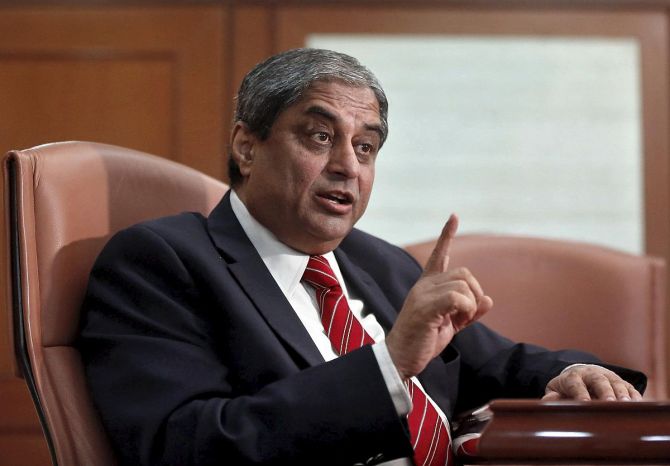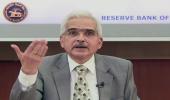Unlike any other business, banking is a turf where the captain's role is the most critical.
Often a bank is defined by the personality of the CEO who runs it.Both HDFC Bank and Kotak Mahindra Bank are the creation of their CEOs, notes Tamal Bandyopadhyay.

Uday Kotak, MD and CEO of Kotak Mahindra Bank Ltd, will step down on December 31, ending his close to 21-year tenure since February 2003.
The only banker who has had a longer stint as CEO in India is HDFC Bank Ltd's former boss Aditya Puri -- 26 years.
Like Kotak, he had been with the bank since its inception (in 1994) and retired in October 2020.
Of course, there is a difference between the two: Kotak is the promoter of the bank, while Puri is a professional.
Among the current CEOs of private banks who have long stints are Murali M Natrajan of DCB Bank Ltd (14 years, since April 2009); Shyam Srinivasan of The Federal Bank Ltd (over 12-and-a-half years, since September 2010) and N Kamakodi of City Union Bank Ltd (over 12 years since May 2011).
In April, Kamakodi got the Reserve Bank of India's nod for his re-appointment for another three years.
His tenure will end by April 2026 as the RBI has capped the stint of non-promoter CEOs at 15 years even though the retirement age for a private bank's CEO is 70.
Kamakodi will be 52 in 2026. One can be re-appointed after a gap of three years, provided there's no association with the bank in any way during that period.
Have these gentlemen been occupying the corner office far too long? Let's take a look at the US banking system.
James Dimon, 67, has been the chairman and CEO of JPMorgan Chase since 2005.
A February 2022 article on the tenure of bank CEOs in American Banker talks about many who have been at the helm for decades.
The longest-serving CEO among the top 100 US banks is Richard Adams -- 48 years. He has led United Bankshares and its predecessor, the Parkersburg National Bank in West Virginia, since 1975.
George Gleason of Bank OZK has been there for 43 years, followed by James Herbert of First Republic Bank in San Francisco (37 years) and Dominic Ng who has led East West Bancorp for more than three decades, since 1991.
First Republic Bank was shut down on May 1 and its assets were sold to JPMorgan Chase & Co.
The list includes Harris Simmons (CEO of Zions Bancorporation for 32 years) and Richard Fairbank, CEO of Capital One Financial (28 years) -- one of the 10 largest commercial banks in the US -- which he co-founded in 1994.
Among other long-serving bank CEOs, Edward Wehmer has been running Wintrust Financial for 24 years and Terry Turner has spent 22 years at Pinnacle Financial Partners, the second largest bank in Tennessee.
Matt Wagner, too, has been there for 22 years as the CEO of PacWest Bancorp.
Finally, Joseph DePaolo had been the CEO of crypto-friendly Signature Bank for 21 years till it collapsed in March 2023, the second biggest bank failure in the US since Washington Mutual closed in 2008.
Like India, at least three other countries -- Nigeria, Ghana and Myanmar -- limit the tenure of a bank CEO.
Unlike any other business, banking is a turf where the captain's role is the most critical.
Often a bank is defined by the personality of the CEO who runs it.
Both HDFC Bank and Kotak Mahindra Bank are the creation of their CEOs.
Of course, there are bankers who in their obsession to become larger than the institution have invited trouble for themselves as well as their banks.
A May report of Yes Securities (India) Ltd talks about the tenure of some of the current bank CEOs and how long they can remain at the helm.

Amitabh Chaudhry's current term at Axis Bank Ltd ends in December 2024. Going by the RBI norm, he can continue till December 2033.
Both Sandeep Bakhshi of ICICI Bank Ltd and Sashidhar Jagdishan of HDFC Bank Ltd will see their current term ending in October this year.
Bakhshi can continue till May 2030 and Jagdishan till March 2035, provided the RBI gives its nod to the renewal of their tenures.
The RBI's approval for IndusInd Bank Ltd CEO Sumant Kathpalia is in place till March 2025. At the helm since March 2020, he will turn 70 in December 2031.
IDFC Capital First Bank Ltd's CEO V Vaidyanathan's current term ends in December 2024. He turns 70 in January 2038, but will complete his 15 years (provided the banking regulator gives its nod) by December 2033.
The RBI's approval for Bandhan Bank Ltd's Chandra Shekhar Ghosh's existing term ends in July 2024. Theoretically, he can continue till August 2030.
These are private sector bankers. Now, take a look at the top brass of some public sector banks.

The current term of Bank of Baroda MD Debadatta Chand will end in June 2026.
But he can remain at the helm till January 2031 when he turns 60.
Similarly, Bank of India boss Rajneesh Karnatak's term ends in April 2026, but he can continue till July 2030.
Karnatak and Chand are the two youngest leaders among the current crop of public sector bank CEOs.
Atul Kumar Goel of Punjab National Bank, who had headed UCO Bank before the current assignment, will see his tenure ending in December 2024 when he turns 60.
The current term of A Manimekhalai, CEO of Union Bank of India, will end in June 2025. She will turn 60 nine months later in March 2026.
Will she get another term? If yes, for how long?
Similarly, Shanti Lal Jain of Indian Bank will turn 60 in December 2024.
His current term is ending in August 2024. Will he have to demit office before turning 60?
In the past, there have been instances of nationalised bank chiefs retiring after completing their term, but before touching 60: K R Kamath (he first headed the Allahabad Bank, merged into Indian Bank in 2021, and then Punjab National Bank) and Rajeev Rishi (Central Bank of India) are two such examples.
Recently, Bank of India chief Atanu Kumar Das, too, retired a few months before completing 60.
A finance ministry notification in November 2022 stated that the top-level appointment at nationalised banks could initially be for up to five years and extended by another five years.
However, it is silent on the age of retirement. The past norm was three years or till the age of 60, whichever was earlier.

The crowd of relatively young bankers at the senior level is probably the reason behind extending the tenure of MDs and executive directors.
A few of the EDs are in their early 50s and at least one is in his late 40s.
Since the number of such banks has shrunk to 11 after the government's consolidation drive, there aren't too many positions at the top.
But, even after the change, some of the EDs -- who are not promoted to be MD -- may have to retire before they turn 60.
Unlike the bosses of nationalised banks, the State Bank of India's chairman can remain at the helm even after hitting 60.
Typically, the tenure is for three years.
There are exceptions, though. For instance, Arundhati Bhattacharya got a one-year extension beyond her three-year term and O P Bhatt got close to a five-year term, one shot.
The extension of the tenure of whole-time directors of nationalised banks to 10 years is fine, but why can't the retirement age be extended to 70 a la private banks? Why should we have two sets of rules?
The RBI has started showing the door to those who compromise on governance, but its patience for non-performance is still pretty high.
The regulator also needs to be consistent in its approach to approving a new term of the CEO.
In the recent past, there has been at least one instance where a private bank's boss got a fresh term of one year despite its board recommending three years.
The RBI followed it up with a three-year term! Doesn't it create confusion?
Tamal Bandyopadhyay, author of Roller Coaster: An Affair with Banking, is a senior advisor to the Jana Small Finance Bank Ltd.
Feature Presentation: Aslam Hunani/Rediff.com











